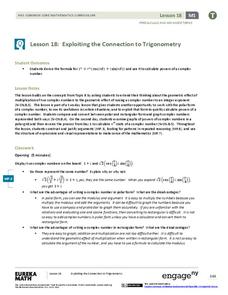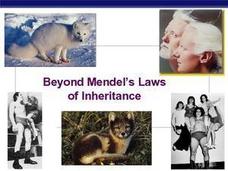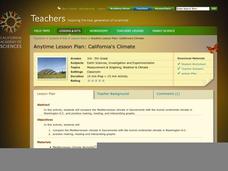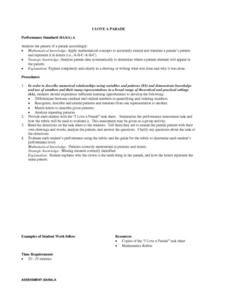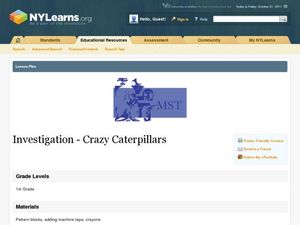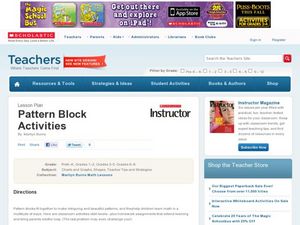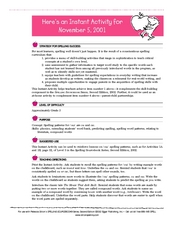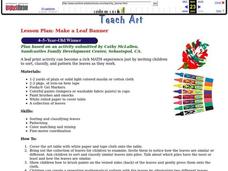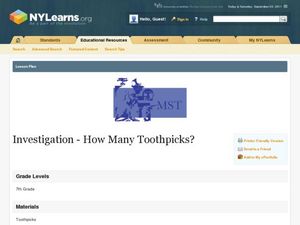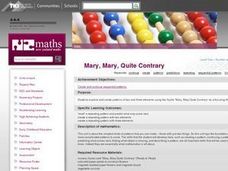EngageNY
Exploiting the Connection to Trigonometry 1
Class members use the powers of multiplication in the 19th installment of the 32-part unit has individuals to utilize what they know about the multiplication of complex numbers to calculate the integral powers of a complex number. Groups...
Noyce Foundation
Boxes
Teach your class to think outside the box. Scholars use the concept of equality to solve a problem in the assessment task. They determine how to use a scale to identify the one box out of a set of nine boxes that is heavier than the others.
Curated OER
Sentence Combining/Sentence Variety
Challenge your writers to improve their writing by introducing them to 10 strategies they can use to vary their sentence structures. Each strategy is described and examples given. Pupils then create their own sentences using this...
EngageNY
Logarithms—How Many Digits Do You Need?
Forget your ID number? Your pupils learn to use logarithms to determine the number of digits or characters necessary to create individual ID numbers for all members of a group.
West Contra Costa Unified School District
Fractional Exponents and Property of Exponents
Don't just use a fraction of this resource ... use it all. Learners first investigate patterns to determine how to deal with fractional exponents. Individuals then evaluate expressions involving fractional exponents.
Mathematics Vision Project
Module 1: Functions and Their Inverses
Undo a function to create a new one. The inverse of a function does just that. An inquiry-based lesson examines the result of reversing the variables of a function, beginning with linear patterns and advancing to quadratic and...
Curated OER
Beyond Mendel's Laws of Inheritance
This PowerPoint jumps right into the details of unusual traits and how they are coded. The epistasis patterns in Labradors are used as a main example, and many instances of polygenic inheritance malfunctions are explained. All of this...
California Academy of Science
California's Climate
The United States is a large country with many different climates. Graph and analyze temperature and rainfall data for Sacramento and Washington DC as you teach your class about the characteristics of Mediterranean climates. Discuss the...
Teach Engineering
Surface Tension Lab
What constitutes a good soap bubble? In the second installment of a nine-part series, scholars apply their understanding of surface tension to soap bubbles. They experiment to determine the best solutions to use for the...
NOAA
Ocean Geologic Features
Sediment samples from the ocean bottoms tell scientists about climate change, pollution, and changes in erosion for the area. Groups of learners focus on sediments and their movement through water. During a hands-on activity, they...
Science Matters
Seismic Activity and California Landforms
By the 19th instructional activity in the 20-part series, scholars realize volcanoes and earthquakes are related to plate boundaries. The instructional activity extends and applies the knowledge by having individuals create a bumper...
Curated OER
Math: The Cathedral Project
Second graders take a field trip to a nearby church or other historical building and examine it from a mathematical perspective. In groups, they calculate the seating capacity, describe the window patterns, differentiate types of...
Novelinks
The Giver: Concept Analysis
Cover the vocabulary and thematic concepts from Lois Lowry's The Giver with an extended reference guide. It includes relevant plot elements, discussions on themes and motifs, and any possible issues arising from your class's background...
EngageNY
Multiplication of Numbers in Exponential Form
Develop a solid understanding of multiplication and division properties of exponents. Individuals expand exponential terms to discover the patterns and create the properties in the second installment in a series of 15. The activity...
Curated OER
I Love a Parade
Students receive a worksheet that describes a parade. They tell what the 10th item in the parade will be. Students draw the parade, and tell the pattern they see using letters. Students design their own parade with the same pattern. They...
Curated OER
Discovery
Students explore patterns in number problems. They devise a strategy to solve a number problem. Students estimate and calculate answers, making efficient use of a calculator, where appropriate, as part of solving a problem. They...
Curated OER
Red Walls and Green Doors
Fourth graders are shown a pattern and asked how many blocks it would take to have a red wall with fifty green doors. In groups, they are given a set of manipulatives in which they develop the pattern and share their results with the...
Curated OER
Investigation: Crazy Caterpillars
First graders explore biology patterns by creating a model insect. In this patterns lesson plan, 1st graders utilize snap cubes and pattern blocks to recreate their own version of a centipede or caterpillar. Students create their...
Curated OER
Pattern Block Activities
Pupils practice various math skills by using manipulative activities. In this math manipulative lesson, students sort shapes, build hexagons, and build shapes using manipulatives. These activities would be great for parent ed or homework.
Curated OER
Here's an Instant Activity for November 5, 2001
Third graders practice spelling ou words. In this phonics and spelling lesson, 3rd graders brainstorm words using the 'ou' spelling pattern. Students review compound words and brainstorm compounds words. Students complete the 'instant...
Curated OER
Make a Leaf Banner
Students create an leaf print banner, and classify, sort and find patterns in the leaves as they work.
Curated OER
How Many Toothpicks?
Students investigate different geometric patterns. In this geometry lesson, students create different shapes using toothpicks. They create different patterns and designs and complete a charts using different measurements.
Curated OER
Rhythm and Counting
Students repeat patterns while listening to music. In this patterning activity, students listen to a pattern on a tape of music and reproduce it by clapping or stamping their feet. They listen to stories about famous composers.
Curated OER
Mary, Mary, Quite Contrary
First graders use simple vegetable cut out and colored paper flower peddles to make simple patterns. They start out with a simple 2-element patterns around the theme of a daisy and increase in difficulty.


